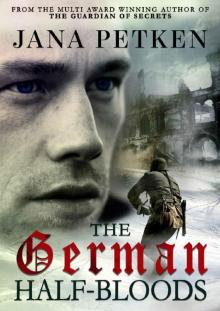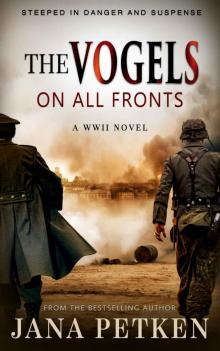- Home
- Jana Petken
Before The Brightest Dawn (The Half-Bloods Trilogy Book 3) Page 2
Before The Brightest Dawn (The Half-Bloods Trilogy Book 3) Read online
Page 2
Gaidar’s eyes widened in surprise. “That’s not good.”
“Anubis is a thinker, Gaidar. He analyses everything I say. He’s not stupid, and I won’t keep him in the dark for much longer. The way I see it, the more I tell him, the more he’ll trust me.”
For show, Max handed Theo a watch. The latter turned it over in his fingers and studied the face and back of it. “Go on.”
“I admitted to Anubis that Bryant was a British intelligence agent who’d been investigating the Muslim Brotherhood’s false propaganda operations against the British. He asked about Farid, the dead Egyptian boy, and his connection to Bryant. I explained that according to the consulate’s records, Farid accompanied John Bryant on trips to Cairo. He was at John’s beck and call and could’ve known about Bryant’s operation to infiltrate the Brotherhood’s gunrunning operations.”
Max popped a few nuts into his mouth and crunched. “That’s all he knows, and all he will know until I’m ready for phase two.”
Theo nodded his agreement. “One step at a time. Well played, sir.”
Max sipped his drink, set the glass on the table and asked Gaidar, “Why haven’t the Egyptian Army made more Muslim Brotherhood arrests? You must have an idea of where they hold their meetings, or at least an inkling of where their leaders live?”
Gaidar tried a watch on for size. “We do know where they held their last meeting, but because of my government’s success in suppressing the group’s militant activities, their Supreme Guide, Hassan el Banna, has agreed to halt all violence until the war in this region ends. It’s a tacit agreement, but an accord, nonetheless. I suppose they don’t want to upset the status quo.”
Gaidar spooned sugar into his tea and continued, “You must understand, the Muslim Brotherhood extends all the way to our Egyptian military academy and into our universities. I believe it also has supporters in the palace. We have uncovered a secret officer’s association within our army and air force, and we know the ring extends the palace’s protection to certain young officers in return for their devoted obedience to the group. We do not want to chop off the arms of the group; we want its head, and that will not be easy to obtain when the leadership is behaving itself, both politically and militarily.”
Theo, on a completely different tack, said, “They can smell a rat a mile off, as John Bryant sadly found out for himself…”
Max gasped as a familiar figure sauntered into the Moorish Hall.
“Are you all right?” Gaidar looked concerned.
Max recovered, but his heart still raced. “Yes. Sorry, I thought I knew someone … ach, I think I’ve had too many whiskies and too much Egyptian sun. Where were we?”
Gaidar handed Max a roll of English pounds, concealing a piece of paper containing a message from Heller in London. Then he put the watch he’d just purchased on again. “Please remember, it will take some time to get you a meeting with the Brotherhood Council … months, perhaps. First step: your asset, Anubis, must be accepted by the group.”
Max agreed. “Which is why being pally with the Sudanese man is important.”
Gaidar concurred and continued, “Step two. If he can get in with the group, he must focus on the military wing.”
“You mean the Secret Apparatus?”
Gaidar nodded. “They’re the ones who will be interested in buying weapons. Step three. Once he tells the Brotherhood about your devotion to Adolf Hitler and interest in selling guns to the Nazis for use against the British, they will begin to follow you everywhere you go. They will dissect every aspect of your life, both in Cairo and in Alexandria, and only when they have decided you are genuine and not a threat, will they allow you within ten feet of the Secret Apparatus leader – one sniff of you being undercover for the British, and they will take your head, no explanation given – yes, Theo, like John Bryant.”
Max knew how dedicated members of the Muslim Brotherhood were. In April of the previous year, Rommel had been advancing on Egypt. The British had pulled back the Arab units at the front to stop the gunrunning operations which were going on in these far-flung outposts between Egyptian soldiers and the radical Islamists. Disloyalty and deceit were everywhere, which was probably the reason his MI6 colleague, John Bryant, had got himself killed.
Gaidar’s face creased with a frown. “Make no mistake, Herr Fischer, we have tried this approach several times, and we have failed.”
“Ah, but you have not tried it with me,” Max grinned.
The Egyptian’s scowl increased until his eyebrows met in the middle with anger. “You think this is a joke? It is deadly serious…”
“We’d better get back to the office. Yes … it’s late,” Theo stuttered. “It’s been good doing business with you, Herr Fischer.”
Theo stood, abruptly ending the meeting and stopping Gaidar from saying anything else for the moment.
After Theo had said his goodbyes, Gaidar reluctantly shook Max’s hand. “You become cocky, as you English say, and you are a dead man on a street in Cairo,” he muttered in Max’s ear.
Chapter Two
Alone, Max ordered another whisky while willing his brother-in-law to turn in his chair and spot him. Had Max not already been sitting, he would have fallen over when he saw Frank Middleton stroll into the place. This day had just got better.
Feigning a relaxed pose, Max opened his briefcase displaying his watches. He held his newspaper below face level so that Frank could see him if he turned, and he had his empty whisky glass by his side. His cover was secure. He wasn’t going anywhere until he’d spoken to his best friend.
A while later, Max’s head shot up from his newspaper at the sound of Frank’s booming voice.
“Ah, there’s the Swiss watch bloke. I think I’ll treat myself. My damn watch keeps losing time,” Frank said to the men he was preparing to leave with.
After Frank’s company had mumbled their disapproval to him, they left.
Frank sat next to Max and beamed. “Well, sink me in the bloody Med. You’re the last person I thought I’d see here.”
“I’m glad you remembered my Swiss cover. Nicely done, Frank.”
Satisfied they were being largely ignored and that the people at the nearest table were on their feet about to leave as well, Max asked, “Any news from home?”
“Yes, at last,” Frank replied when the people had left the hall. “I got a letter from Hannah. She’s moved in with your parents, and she’s much happier. I hated that she was living in Kent with the baby and having to travel to see your mum and dad every week. At least they’re all together now, and far enough away from London for me not to worry too much about the damn air raids hitting the capital.”
“Did she mention the situation between Judith and me?” Max asked.
“Situation? That’s a bit on the formal side for what you two have done,” Frank laughed. “Yes, of course she did. Judith is spending a lot of time in London, working with Heller. Hannah told me your fiancée is happy. Worried about you, but also excited about the wedding. Your sister also said you’re planning on getting married as soon as you get back to England. Is that true?”
“Yes, the sooner, the better.”
Frank lit a cigarette while holding Max’s eyes. “I don’t mind telling you, I was shocked when I read about you and Judith getting together. I didn’t even know you’d been seeing her.” Frank hesitated, as though considering his words. “Are you sure about your feelings, Max? Don’t get me wrong. I like Judith, but you hardly know the girl. Has this anything to do with you trying to get over Klara Gabula? Damn shame about her death. Dying on a jump is a bloody awful way to go.”
“No. How I feel about Judith has nothing to do with Klara.” Max shook off his hatred of Florent Duguay. Frank apparently didn’t know the real story of Klara’s death, and he was not going to share classified material, not even with his sister’s husband. “I saw a lot of Judith when I was in England, Frank,” he said, returning to a more pleasant subject. “We spent enough time together for m
e to know. I’ve never felt this way before … not with anyone.”
Frank nodded, satisfied with Max’s answer. “And here’s me thinking I’d be your best man if you ever got hitched. Thought I might even have to fight Paul for the job. It’s not right … you, tying the knot without your brothers and me by your side … especially Paul, given his association with Judith.”
“I know. I don’t suppose you’ve got news of Paul and Wilmot?”
“No. Sorry, mate.”
Disappointed and with a heavy heart, Max’s eyes swept the area again. He’d like nothing more than to talk all day about Judith and his two brothers – who were still missing as far as their family were concerned – but he and Frank had little time before someone would get suspicious. Frank could only take so long to choose a watch or converse with a stranger from Switzerland.
“It’s a mess over here.” Frank’s expression grew serious as he fingered a watch.
For the first time, Max noted the dark, unhealthy rings under Frank’s eyes. “What are you doing in Egypt?”
“Various things, but not what I was sent out to do … that was a bloody nonstarter.” Frank continued to handle a watch, turning it over in his fingers, peering closely at the quality inscription on the back of it. “I was originally sent here to turn Italian fascists being held in prisons on the Delta to our side. We thought they might already be disillusioned with Mussolini; we could train them, then send them back to work on the downfall of Il Duce’s regime. Hard to believe, but so far, we’ve not found one recruit. Our failure is probably the reason I got shifted into a commando group a month after I got here.”
Frank drew on his cigarette. “Our defences have fallen like skittles, Max. We had what looked like an impregnable line from Gazala to Bir-Hakeim. It was well-constructed with a series of fortified barbed wire areas and minefields. We had rough-made dugouts big enough to house a brigade with field artillery, armoured car units, and camouflaged tanks to boot.
“Our battalions dug in for the long-term with underground bunkers with reinforced ceilings to resist air raids. We had plenty of food, medicine, and ammunition, and we’d planted over a million mines in the desert between the keeps and dugouts. We thought we were set. Then Rommel’s Panzers smashed into our armour and dug into the middle of the British positions. At one point, they were behind our lines!” Frank rolled his eyes. “In their wisdom, the British commanders thought they’d keep the krauts busy in an area known as the Cauldron, called that for obvious reasons – did you know you could fry an egg on the ground in that place?”
“Really? And who’d want to eat a dirty egg?” Max grinned. “Sorry, carry on.”
Frank chuckled then grew serious again. “That was another mess. It was all over when Rommel took out one of our dugouts and almost two thousand men with it.”
“Jesus, I heard it was bad,” Max said, having heard a more palatable version from Theo days earlier.
“It was a lot worse than bad. The Free-French Forces at Bir-Hakeim also surrendered,” Frank continued. “There are hundreds of miles of road going around the North African coastline. Airfields lying behind the highway are full of stores, ammunition, gasoline dumps, and military vehicles. We managed to get into a couple of Rommel’s depots and do significant damage to his supplies. That slowed him down, but to be honest, I don’t know how we’re going to stop him – Christ, he’s sixty fucking miles from Alexandria. Who’d have thought it?”
Given they were in a public place, Max was loath to ask too many questions or prolong the conversation, but no one was paying them the slightest attention. He knew about the latest British defeat; everyone in Cairo had heard about the fall of Tobruk and Rommel’s superhuman advances. What he didn’t know was why Frank was still in Egypt.
Whilst looking at watches, Frank pre-empted Max’s question. “I’ve been attached to a team who are carrying out commando-style raids in the desert in the effort to damage Rommel’s supply lines. I can’t say any more than that, Max.”
Max surmised that the teams were operating in secret, unknown even to each other. Heller had spoken about a new unit called Special Air Services, or SAS, being set up in North Africa.
“How the hell did we let Rommel take Tobruk?” Max hissed. Not having military contacts in Cairo, he had depended on Theo Kelsey’s intelligence to know on what was going on in the desert. According to him, the British Commander-in-Chief of the Middle East theatre, General Claude Auchinleck, had insisted Tobruk be held at all costs.
‘Easy to say, when he’s on Shepheard Hotel’s terrace sipping mint-juleps and kissing the hands of refugee royals like the ex-Prince Regent of Yugoslavia, Prince Paul, and his wife, Princess Olga,’ Theo had spat during that conversation. Then he had added that Auchinleck was a mediocre general, who was overconfident and overly optimistic about his chances of defeating Rommel. ‘He’s a man who believes in perpetual British Empire glory but ignores the messy parts that go into achieving and maintaining it.’
“Rommel’s forces broke through the Eighth Army lines to Tobruk’s town and harbour,” Frank finally answered Max’s question. “I saw how hard our soldiers fought. If you ask me, they hung on for as long as they did because of their courage, and despite the mismanagement and military incompetence at the top. Command headquarters looked like a bloody harassed committee with the left arm not knowing what the right one was doing. Supplies and reinforcements were juggled about and cobbled together as the moment dictated – total chaos in careless hands.”
“The BBC should be shot and dragged through the coals for its broadcasts,” Max said, veering from the topic of battle. “Saying Tobruk might be lost, but it wasn’t that important anyway must have demoralised the shit out of our troops fighting for their lives inside that town.”
“I’d shoot the announcer myself if I could get my hands on the idiot. To be honest, Max, we had no answer for the Germans’ bombardments of the harbour. They sent wave after wave of Stukas, plus we were expecting the assault to come from the south-western sector, but the sly bastards came in from the south-east. The South Africans held the harbour for a while after the Eighth Army retreated, and when they were eventually pushed out, they burnt all our petrol and pierced every water tanker they could find. Tell you what, if I hear any bluffer making excuses about this loss, I’ll belt him in the mouth.”
Frank handed the watch back to Max, regret crossing his face. “I need to go. It’s been great seeing you, Max, but we won’t be meeting again, at least not here. I’m being shipped to Jerusalem tomorrow. SOE’s Cairo branch has established a commando and parachute training school near Haifa. I suppose I’ll be teaching there for quite some time.”
The men grew silent. Max was also disheartened. He’d cheered up no end when he’d thought there was a chance of seeing Frank around the city.
“Short but sweet, eh, Frank?” Max said, shaking Frank’s hand.
“At least, you know where I’ll be,” Frank said, apparently gauging Max’s mood. “When you get home, tell Hannah I love her.”
Max smiled as he replaced the watch in its case. “Here, take this as a gift. Heller’s office paid for them.”
Chapter Three
Alexandria, Egypt
30 June 1942
After an hour and a half spent travelling on an almost-empty train from Cairo, Max arrived in the coastal city of Alexandria. A week earlier, the same train had been full of people, desperate to escape the capital’s oppressive heat and to have a pleasant summer by the sea. Today, however, Alexandria was synonymous with fear; it was going to fall to Rommel, and the British were preparing their messy exit in full view of the Egyptian residents.
“We’re getting out before the Germans get in. We’re going to South Africa. It’s the safest place left to us,” Max overheard one man saying to another on the crowded platform.
Max, although understanding why he was witnessing the most substantial exodus from Egypt since Moses and the Jews, was still confident the British could hold
the Germans and their Afrika Korps back. Yes, they had seemed unstoppable; striking deep into Egypt and threatening the vital Allied supply line across the Suez Canal. They’d pursued the chaotic British Eighth Army like adults chasing short-legged children, but the situation had changed. Rommel now had overextended supply lines and a lack of reinforcements. His troops were desert-weary and physically exhausted, and though he might yet surge forward before the Allies built up their defences, Max thought it unlikely. Even the Great Rommel, thus named by treacherous Arabs, would have to regain his strength. He was not invincible, and neither were his men.
Taxis, most of them mule or horse-driven, arrived at the station’s drop-off point then drove off again to look for new passengers trying to get to the trains. Max decided to walk to his destination to get a better sense of the city’s mood and to see the bomb damage from a recent heavy air raid.
Egypt’s two major towns painted a stark contrast to one another, Max thought. Cairo, an Islamic centre looking to the East, was embroiled in politics and royal court scandals. Alexandria, Greek-Levantine, faced the Mediterranean, thrived on summer tourism, and had a strong expatriate presence, dominated by Greeks. It was a playground, and unlike Cairo, it catered to the poor as well as the rich.
The city centre was almost deserted and eerily quiet. Max heard no noisy street vendors and saw no Arabic men chatting or debating outside cafés while puffing away on their shisha pipes. He looked at his watch; it was prayer time, when the world stopped.
A few foreign women were doing their rounds of the shops – things must be dire. On the Corniche, where entire families usually ate outside cafés under straw shadings, tables and chairs were empty. Instead of the cacophony of city noises, telephones rang intermittently in empty houses whilst outside their residents packed up cars with belongings, and strapped mattresses onto their vehicle roofs as a precaution against falling debris from explosions. Meanwhile, the Egyptians looked on, some amused, others terrified by their British colonials’ public withdrawal.

 Blood Moon
Blood Moon The Guardian of Secrets and Her Deathly Pact
The Guardian of Secrets and Her Deathly Pact Dark Shadows
Dark Shadows The German Half-Bloods (The Half-Bloods Trilogy Book 1)
The German Half-Bloods (The Half-Bloods Trilogy Book 1) Swearing Allegiance (The Carmody Saga Book 1)
Swearing Allegiance (The Carmody Saga Book 1) The Errant Flock
The Errant Flock The Vogels: On All Fronts (The Half-Bloods Trilogy Book 2)
The Vogels: On All Fronts (The Half-Bloods Trilogy Book 2) The Guardian of Secrets
The Guardian of Secrets Before The Brightest Dawn (The Half-Bloods Trilogy Book 3)
Before The Brightest Dawn (The Half-Bloods Trilogy Book 3) Blood Moon (The Mercy Carver Series Book 2)
Blood Moon (The Mercy Carver Series Book 2) Dark Shadows (The Mercy Carver Series Book 1)
Dark Shadows (The Mercy Carver Series Book 1)